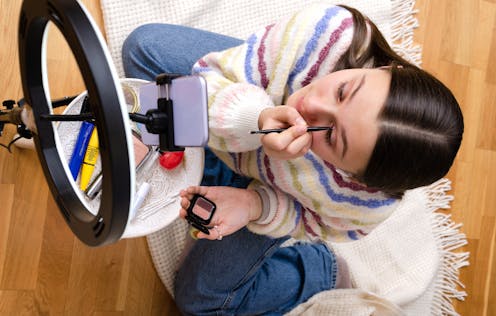Gen Z beauty brands can use 'friendly' chatbots to boost body image as well as sales, research shows
- Written by Nisreen Ameen, Senior Lecturer in Digital Marketing, Royal Holloway University of London

Some members of “generation Z” – people born after 1996[1], the oldest of whom are turning 26 in 2022 – spend hundreds of pounds per year on beauty products[2]. In fact, gen Z members are often more willing to spend on beauty and skincare products than previous generations[3].
You can listen to more articles from The Conversation, narrated by Noa, here[4].
But research also shows that young women’s body image[5] is linked to cosmetics use. They often use beauty products to conceal perceived flaws or compensate for body parts they may not like. Members of gen Z are particularly plagued by negative perceptions of body image[6] and low self-esteem. This has been linked to the high use of social media[7] among this age group.
So, cosmetics companies that are trying to sell to this age group – as most of them are – should be mindful of these self-esteem issues, particularly where makeup purchases are involved. Research I conducted with colleagues shows they can incorporate this awareness into the technology tools they offer shoppers – in particular, the new breed of “beauty chatbots” – in order to help boost body confidence while also making sales.
Beauty tech
Cosmetics brands often use cutting-edge technology[8] to sell their wares. Companies such as Mac[9], Sephora[10] and L’Oréal[11] all use tech including artificial intelligence, augmented reality and data analytics to help customers discover and choose new makeup these days.
In particular, augmented reality has been used to develop virtual try-on tools[12] that help online shoppers test makeup online to see how it looks, based on things like skin type and hair colour, before buying. Research shows this experience supports people’s existing perception of their body image[13], whether those perceptions are positive or negative.
Alongside such tools, chatbots[14] are often used by makeup brands to support online shopping. As an AI-powered online sales assistant, a chatbot can communicate with shoppers via a small box on-screen, into which a person can type questions or answers while they’re browsing a website. This allows makeup buyers to interact with brands through online conversations[15].
Around 80% of companies worldwide use chatbots[16], and they can also be a way to collect data[17] about site users.
Two of the benefits of using chatbots are the ability to personalise interactions with customers – such as when they are using virtual try-on tools – and to automatically offer relevant products and services[18]. Of course, any salesperson knows the power of personality when it comes to enticing shoppers to buy, but can chatbots charm in the same way?
Friendship goals
Our research analysed how experiences of using various cutting-edge technologies[19] when shopping for beauty products affect body image, self-esteem and purchase behaviour among younger females. Our data was collected from three studies, a survey and two experiments involving 1,568 gen Z women.
While these tools are designed to provide a better customer experience, our research shows there are benefits to programming chatbots to be “friendlier”.
The majority of cosmetics brands currently offer chatbots with two types of personality: friend or assistant. Assistant types offer intelligent, factual and organised support and information in response to customer enquiries. But chatbots that also have friend‐like characteristics – such as being sassy, perky and humorous – encourage stronger feelings of warmth.
We found that, for women in this age group, receiving support from a chatbot in the form of a “virtual friend” can have a more positive effect on their body image and self-esteem. The type of communication used by these chatbots was characterised by our respondents as being helpful, nice and friendly. The findings also show that that chatbots with these characteristics positively affected participants’ self-esteem and buying behaviour when using beauty brands’ virtual applications.
Sales boost
As well as improving gen Z women’s interactions with virtual makeup try-on applications, friendlier chatbots can encourage people to buy more as well. We found that purchase behaviour was stronger when the gen Z women in our study had conversations with chatbots that they categorised as being helpful, nice and friendly.
But beauty brands that offer chatbot services can create benefits beyond increasing sales and improving customer relationships. They can also boost shoppers’ body image – an important benefit for gen Z beauty-lovers.
Brands should keep this in mind when choosing the style of language used by their chatbots. Using a more personalised, conversational style when interacting with young female customers will not just increase sales, it could also boost their body confidence.
References
- ^ born after 1996 (www.pewresearch.org)
- ^ beauty products (www.pipersandler.com)
- ^ than previous generations (assets.ctfassets.net)
- ^ here (theconversation.com)
- ^ young women’s body image (www.theseus.fi)
- ^ negative perceptions of body image (www.glamourmagazine.co.uk)
- ^ the high use of social media (wp.nyu.edu)
- ^ cutting-edge technology (onlinelibrary.wiley.com)
- ^ Mac (graziamagazine.com)
- ^ Sephora (www.retaildive.com)
- ^ L’Oréal (www.cosmeticsdesign-europe.com)
- ^ virtual try-on tools (www.sciencedirect.com)
- ^ existing perception of their body image (www.sciencedirect.com)
- ^ chatbots (theconversation.com)
- ^ online conversations (chatbotsmagazine.com)
- ^ companies worldwide use chatbots (www.servicebell.com)
- ^ collect data (www.sciencedirect.com)
- ^ offer relevant products and services (www.sciencedirect.com)
- ^ experiences of using various cutting-edge technologies (onlinelibrary.wiley.com)







